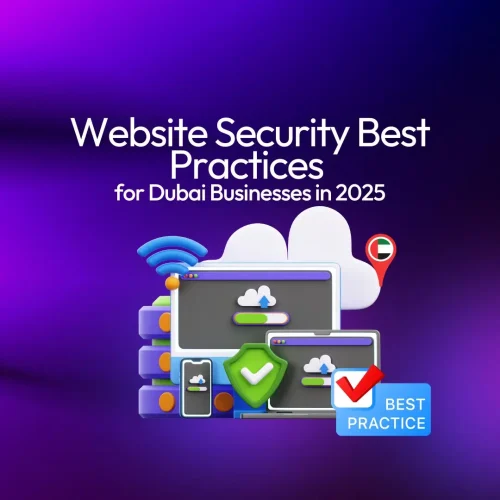Website Security Best Practices for Dubai Businesses in 2025

Website security is no longer a background task handled only by IT teams.
It’s a business-critical concern that directly impacts customer trust, brand reputation, and even legal compliance. Just one overlooked vulnerability can result in a data breach, website shutdown, or costly recovery.
With cyberattacks increasing across the UAE, business owners in Dubai must proactively protect their websites. Whether you’re running an eCommerce store in Deira or a professional services site in Business Bay, this guide outlines the most important security practices for 2025.
1. Install and Maintain SSL Certificates
An SSL certificate encrypts the data transferred between your website and users. It changes your domain from HTTP to HTTPS and shows a padlock icon in the browser, signaling a secure connection. Using a reliable certificate provider and renewing it on time builds user trust and improves your Google ranking.
2. Keep Your CMS and Plugins Updated
Website platforms like WordPress and Shopify release updates to fix bugs and patch vulnerabilities. Outdated themes and plugins are one of the most common entry points for hackers. Regular monthly maintenance ensures your system stays current, secure, and stable.
3. Use Strong Passwords and Enable Two-Factor Authentication
Strong passwords should include a mix of uppercase and lowercase letters, numbers, and special characters. Two-factor authentication (2FA) adds an extra layer of protection by requiring a second step such as a code sent to your phone. Together, these two steps help prevent unauthorized access to your admin panel.
4. Set Clear User Roles and Permissions
Every team member should only have access to the parts of the website they actually need. Avoid giving admin access to editors or contributors. Reviewing permissions every quarter and removing unused accounts reduces your risk of internal security threats.
5. Add a Web Application Firewall (WAF)
A WAF acts as a barrier between your website and harmful traffic. It blocks malicious activities like SQL injections, DDoS attacks, and cross-site scripting before they even reach your server. Cloudflare and Sucuri are examples of trusted providers that offer this service.
6. Backup Your Website Regularly
Website backups are your last line of defense in case of a crash, malware infection, or accidental data loss. Back up both your site files and databases weekly or even daily for active sites. Store copies in secure cloud services and test them periodically to ensure they can be restored.
7. Monitor for Malware and Intrusions
Tools like Wordfence, Jetpack, or SiteLock scan your website regularly for malicious code, malware, or suspicious file changes. Enabling real-time alerts helps you detect threats immediately so you can respond before any damage is done.
8. Secure Payment Gateways and Customer Data
Using a PCI-compliant payment processor like Stripe or PayTabs ensures customer data is handled safely. Never store credit card information on your website. SSL encryption should be applied to every page where users enter personal or financial details.
9. Protect Login Pages and Contact Forms from Bots
Adding CAPTCHA or reCAPTCHA to login and contact forms helps stop spam and automated attacks. Limiting the number of failed login attempts adds another level of protection. Renaming your default admin login URL makes it harder for bots to find your backend.
10. Follow UAE Cybersecurity Regulations
The UAE’s Cybercrime Law requires businesses to follow certain cybersecurity standards. Staying informed and compliant helps you avoid fines or legal issues. If you handle customer data, consider getting cyber liability insurance. It’s also important to train your team to recognize phishing emails, social engineering tactics, and unsafe browsing behavior.
Final Thoughts
Cybersecurity is no longer optional—it’s a requirement. A secure website protects your business from data breaches, downtime, and customer distrust. Dubai businesses that follow these security best practices in 2025 will not only avoid risk but also gain a competitive edge by building digital trust.
If your company is launching a new website or updating an existing one, make security a key part of your strategy from day one. It’s an investment that protects your brand, your customers, and your bottom line.

